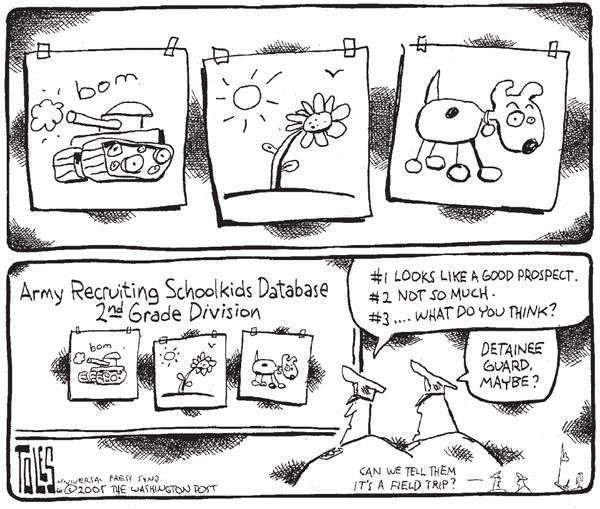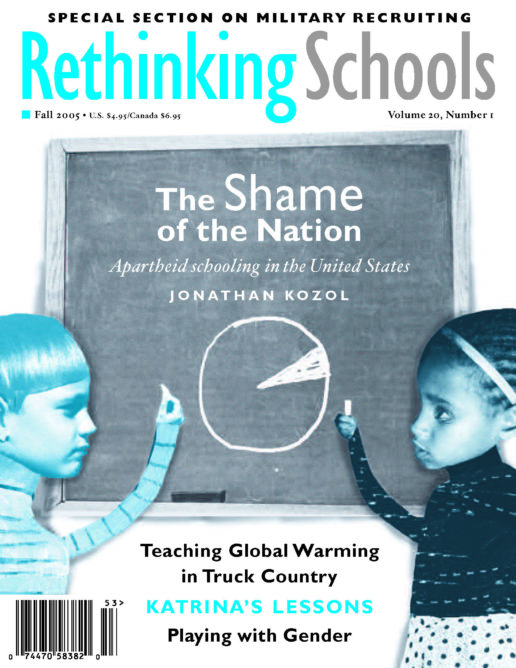Short Stuff 20.1

Reprinted with permission of Universal Press Syndicate. All Rights Reserved.
NCLB Rebellion
The state of Connecticut announced in August it is suing the U.S. government over the No Child Left Behind (NCLB) law. State officials object to NCLB’s testing mandates, which it says are unlawful because they require state and local governments to pay for testing. Connecticut joins the National Education Association (NEA) and school districts in Vermont, Michigan, and Texas in lawsuits. “We in Connecticut do a lot of testing already, far more than other states,” says Republican Gov. Jodi Rell. “Our taxpayers are sagging under the crushing costs of local education. What we don’t need is a laundry list of things to do—with no new money to do them.”
Ruling Out Recruiters
A new Seattle school board policy standardizes the way military representatives can recruit in city high schools. The guidelines solidify a districtwide policy. Under the new regulations, students are ensured protection from recruiter harassment, false information, and disruptions. Also, groups offering alternatives to military service are guaranteed equal access to students along with military recruiters, who must make appointments in advance of visits and set up only in specified areas. Recruiters who do not adhere to the new policy can be kicked off campuses or banned from high schools for the rest of the semester. These policies could aid school-initiated counter-recruitment efforts.
Our Right to Rally
Students at California’s Deer Valley High School have reason to celebrate. The school’s Students for Peace and Justice (SPFJ) won the right to hold a peace rally on campus in an agreement reached with the Antioch Unified School District. The group faced opposition when they submitted plans for the rally to their school administration in February. The principal was concerned that the anti-war message was disrespectful of the military and could be considered offensive. After submitting a revised plan in March, the students were turned down again. Under the new agreement, the students will be allowed to hold their rally on campus during all lunch hours, distribute and display anti-war literature, and utilize the school’s sound system—a first-class First Amendment victory.
Buried Bilingual Benefits
The Bush administration is refusing to publish scientific research demonstrating the values of bilingual education. According to an article in the Los Angeles Times, Bush’s prestigious National Literacy Panel, which cost taxpayers $1 million, used scientific methods to compare bilingual education with English-immersion classrooms. One panelist, Robert Slavin, an education professor at Johns Hopkins University, found that literacy skills increased faster in bilingual classrooms. Slavin resigned from the panel when he wanted to publish his findings and the Department of Education asked him to wait. Now the rest of the panel’s research is completed, and another panelist agrees that bilingual programs work better than English-only programs. The administration has not released the report, saying,
“It’s just not ready.”
The Minority College Priority
According to a 2005 poll by JA Worldwide (Junior Achievement) and the Diversity Pipeline Alliance (DPA), the only type of “interest” deterring African Americans from college is the kind attached to student loans. The study showed that 89 percent of African Americans want to attend college, significantly more than the 79 percent of whites or 77 percent of Latinos with the same goal. The survey also highlights the obstacles between African-American students and their aims. More than 63 percent of African Americans surveyed said “having enough money” was the most significant college barrier, compared to 55 percent of whites and 59 percent of Latinos. For more information, visit www.diversitypipeline.org or www.ja.org.
Reviewing Resegregation
A study released by the Civil Rights Project at Harvard University documents some disturbing trends. More than 70 percent of African-American and Latino students now attend predominantly minority schools, and those segregated schools face extremely high dropout rates. A new book, School Resegregation: Must the South Turn Back?, presents a collection of research regarding the causes, consequences, and solutions to the resegregation problem in the nation’s southern states. Unless the government reexamines the value of voluntary desegregation programs in schools, and unless state leaders take decisive action against segregation, many educational gains from the last 30 years may be undermined.
Tutoring Victory in Chicago Schools
In early September, U.S. Secretary of Education Margaret Spellings announced she would grant a waiver to the No Child Left Behind (NCLB) act that would allow Chicago Public Schools to receive federal funds to tutor students at low-performing schools. One of the oft-criticized provisions of NCLB is a clause that allowed private companies to tutor students who are not meeting benchmarks but prohibits schools from organizing their own after-school tutoring. In January, the Department of Education ordered Chicago schools to shut down their tutoring programs, which served 80,000 students last year, according to The New York Times. This year 278,000 Chicago students are expected to be eligible for tutoring.

